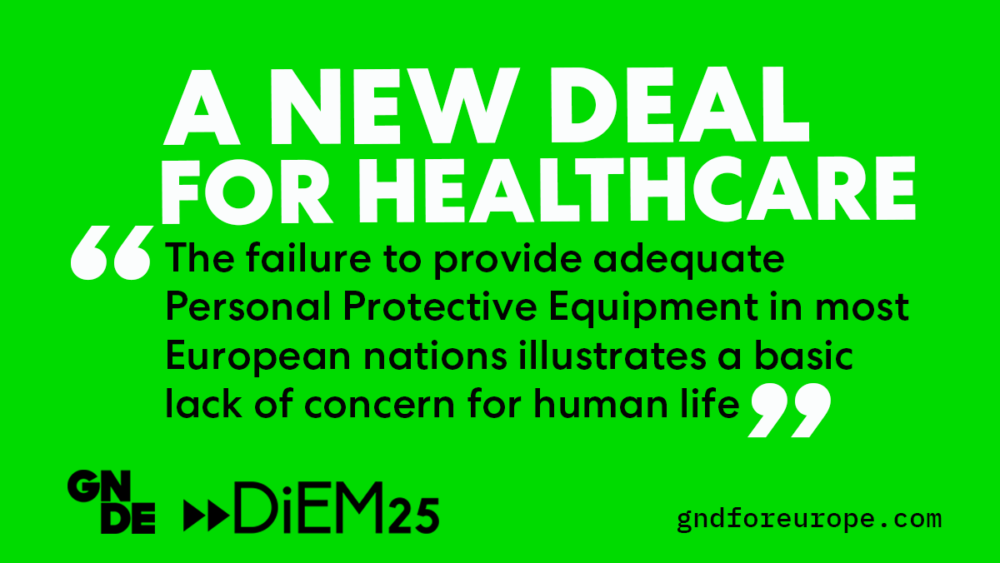If one thing has become apparent during the COVID-19 pandemic, it is that compassion and consideration for Europe’s workforce is fundamentally at odds with the ethos of our current system.
This current crisis has not only revealed fundamental contradictions of function and organisation at the core of the national health care systems of certain nations, but also within the European Union as a whole. Nations were slow to act, failed to provide adequate Personal Protective Equipment (PPE) and failed to coordinate as a union which betrays a profit before people-mentality. The Green New Deal for Europe (GNDE) offers a brighter future for workers by decentralising decision-making processes that would allow people to weigh in on how crises are handled.
It has been self-evident since SARS in 2003 that new forms of viruses capable of creating pandemics were coming.
We even knew that it was probably going to be some form of coronavirus. As the virus was taking hold in China, European leaders such as Italy’s Giuseppe Conte, were urging their nations that “we were prepared for this, we had a plan in place and we’re implementing it.” A month or so later the UK, Italy, France and Spain all had death tolls higher than 20,000. Chomsky illustrated this point in a recent interview: “The scientists knew perfectly well that there were other pandemics coming, probably of the coronavirus variety. It would have been possible to prepare at that point.”
However, little to nothing was done because of the foolish ideological assumption of the ‘neoliberal hammer’: “that governments are not allowed to do anything, that governments are the problem, not the solution.” So, then you turn to drug companies: “they have the resources, they’re super-rich because of the gifts we lavish on them. They won’t do it. They observe market signals. Market signals tell you there’s no profit to be made in preparing for catastrophe down the road.” The decision of whether and how to prevent this crisis could have been made either at the top of governments or at the top of companies — our politicians chose the latter.
The GNDE will help to remedy this lack of action with the decentralisation of decision-making.
The decentralisation of authority will empower local communities to deal with pandemics in ways that best suit them. It was not so much that certain strategies did not work when they were actually put into place. It was more that they were universally applied across countries without being tailored to certain areas based on needs and demographics. Where testing was rolled out in certain areas in Germany, we saw infection rates rise but death tolls slow. However, poor coordination between European nations on the best testing kits to procure meant that each nation went to do this alone with the UK repeatedly buying kits that were faulty or did not work.
Full lockdown and social distancing is more likely to be effective in areas with high infection rates and amounts of vulnerable people — such as the elderly or those with underlying health conditions. But they are less likely to work where those people aren’t as highly present. Establishing a Green Solidarity Network will help connect cooperation arrangements between municipalities, regions, and communities, enhancing information sharing and political decision-making across Europe.
A lack of coordination between regions within nations as well as between nations has been a fundamental problem with the ways that governments have handled the current crisis. The issues deepen when you look at it not just from an individual state but from the perspective of the European Union. There was a fundamental lack of coordination between nation states in the effective procurement of PPE before and throughout the crisis. On a global level, the World Health Organisation (WHO) had neither the funding nor the power to enforce any large-scale international collaboration necessary to combat the pandemic due to the lack of willingness by participating nations. According to the Financial Times, procurement was first discussed on January 31st but it took four negotiation attempts before a deal was made in mid-April.
The GNDE aims to promote discussion and cooperation between nations, and not just in times of crisis.
The Green Solidarity Network serves as a vehicle for decentralised decision-making as it will help disconnected parts of Europe to come together in discussion over how they run their communities. The GNDE aims to invest in public services across the continent — from public parks to childcare services, investing in only the areas that certain communities need. This investment will focus on worker led cooperatives and community projects with an emphasis on municipal or local ownership.
The failure to provide adequate PPE in most European nations illustrates a basic lack of concern for human life. Justifiably so, much of the media attention has been on health and care workers that are being made to work long hours without adequate protection. This has meant that catching this virus and potentially infecting hundreds of other vulnerable people feels like a certainty for many health workers. However, this means that less attention has been focused on those working in essential shops and services. The till workers and bus drivers who are repeatedly exposed to potentially sick people are getting paid very little. The GNDE offers essential workers support where the current plans of governments fall short.
Fundamentally, the GNDE puts workers at the heart of Europe’s green transition.
It does this by:
- Establishing a Green Solidarity Network that enhances horizontal information-sharing and political decision-making in regions, municipalities, and communities.
- Guaranteeing decent jobs to all European residents who seek one as well as instituting a three or four-day work week, fair wages and local job creation.
- Investmenting in worker cooperatives and community-led projects based on municipal or local ownership.
- Instituting a European Health and Care Standard for public healthcare.
- Ensuring that all municipal public transport around the continent is free or available at a low cost.
This crisis has made many people unemployed and overworked others. The GNDE aims to guarantee decent jobs to all European residents who seek one, based on a four-day working week with lower overall working hours, and a care income to compensate care activities helping frontline health workers in hospitals and care homes. Throughout this crisis we have seen frontline health workers, care workers and those working in essential industries pay to commute to work. The GNDE will ensure that all public transport around the continent is free at the point of use or available at a low cost that incentivises its use. A fleet of public taxis and car-pooling services that ensure maximum mobility for all Europeans will also be available for use in the event of such a crisis occurring again. Having resources like this available could help take the strain off of public transport when capacities are limited through social distancing.
The GNDE will not only allow us to cope better in times of crisis but will generally raise the standard of living across Europe. It will do this through the establishment of the European Health and Care Standard, a minimum standard for public healthcare across the continent, and Green Public Works funding to parts of Europe that fall below it. The Green Public Works would act as a public investment agency that would channel Europe’s resources into green transition projects around the continent.
This crisis has illustrated how neoliberalism favours profits before people.
The slow-to-act EU countries and European Union more broadly show the flaws in top-down decision-making as well as the lack of material concern for workers. A lack of coordination or communication at the European level has left each nation to fend for itself with varying degrees of success. The GNDE offers a brighter future for Europe’s workers with solidarity and compassion at its core.
Andrew Potter holds a masters in History from the University College of London (UCL). He plans to do a PhD in Intellectual and Emotional History of Suicide in 19th and 20th century Britain. His other interests and expertise are in the intellectual history of anarchism, left libertarianism and anti-totalitarian thinkers in 19th and 20th century Europe.
Volete essere informati delle azioni di DiEM25? Registratevi qui!




